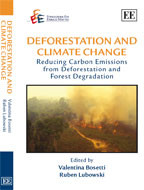Deforestation and Climate Change. Reducing Carbon Emissions from Deforestation and Forest Degradation

22.06.2010
Valentina Bosetti and Ruben Lubowski
Edward Elgar, Series on Economics, the Environment and Sustainable Development
Deforestation and forest degradation have long been recognized as
environmental problems, with concerns over conservation of natural
habitats and biological diversity capturing both scientific and public
attention. More recently, the debate over tropical forest conservation
has radically shifted to the approximately fifteen percent of global
greenhouse gas (GHG) emissions that are caused by deforestation and
forest degradation, and to the potential synergies from integrating
forest management with climate change policies. The goal of this book is
to shed light on some of the major concerns, issues and challenges
related to the inclusion of forest carbon in international climate
policies, as well as to illustrate some of the potential solutions and
paths forward. In addition, the book describes the status of REDD
(Reducing Emissions from Deforestation and Forest Degradation) in
international climate policy negotiations, providing an historical
perspective and highlighting the current positions of key international
players that will frame the future debate at the national, regional, and
international level. This volume will find a broad readership among
researchers and policy makers interested in the environment, climate
change and resource management.
Contributors: Kentaro Aoki, André Aquino, Federica
Bietta, Hannes Boettcher, Valentina Bosetti, Benoît Bosquet, William
Boyd, Andrea Cattaneo, Graham Floater, Steffen Fritz, Alexander Golub,
Mykola Gusti, Petr Havlik, Georg Kindermann, Raymond Kopp, Florian
Kraxner, Lou Leonard, Ruben Lubowski, Ian McCallum, Michael Obersteiner,
Stefano Pagiola, Pedro Piris-Cabezas, Rey Juan Carlos, Nigel Purvis,
Ewald Rametsteiner, Belinda Reyers, Duncan Stone
Deforestation and forest degradation have long been recognized as environmental problems, with concerns over conservation of natural habitats and biological diversity capturing both scientific and public attention. More recently, the debate over tropical forest conservation has radically shifted to the approximately fifteen percent of global greenhouse gas (GHG) emissions that are caused by deforestation and forest degradation, and to the potential synergies from integrating forest management with climate change policies. The goal of this book is to shed light on some of the major concerns, issues and challenges related to the inclusion of forest carbon in international climate policies, as well as to illustrate some of the potential solutions and paths forward. In addition, the book describes the status of REDD (Reducing Emissions from Deforestation and Forest Degradation) in international climate policy negotiations, providing an historical perspective and highlighting the current positions of key international players that will frame the future debate at the national, regional, and international level. This volume will find a broad readership among researchers and policy makers interested in the environment, climate change and resource management.
Contributors: Kentaro Aoki, André Aquino, Federica Bietta, Hannes Boettcher, Valentina Bosetti, Benoît Bosquet, William Boyd, Andrea Cattaneo, Graham Floater, Steffen Fritz, Alexander Golub, Mykola Gusti, Petr Havlik, Georg Kindermann, Raymond Kopp, Florian Kraxner, Lou Leonard, Ruben Lubowski, Ian McCallum, Michael Obersteiner, Stefano Pagiola, Pedro Piris-Cabezas, Rey Juan Carlos, Nigel Purvis, Ewald Rametsteiner, Belinda Reyers, Duncan Stone
